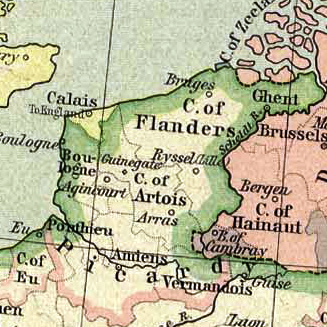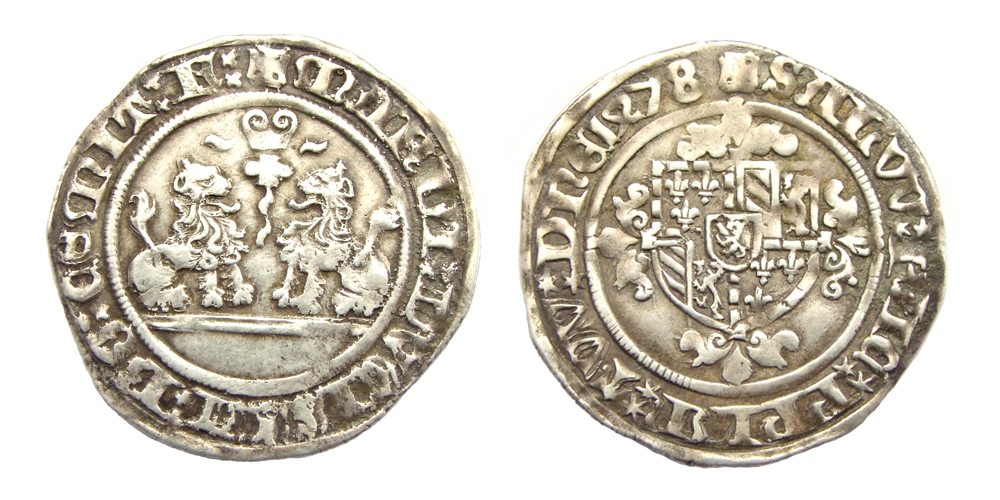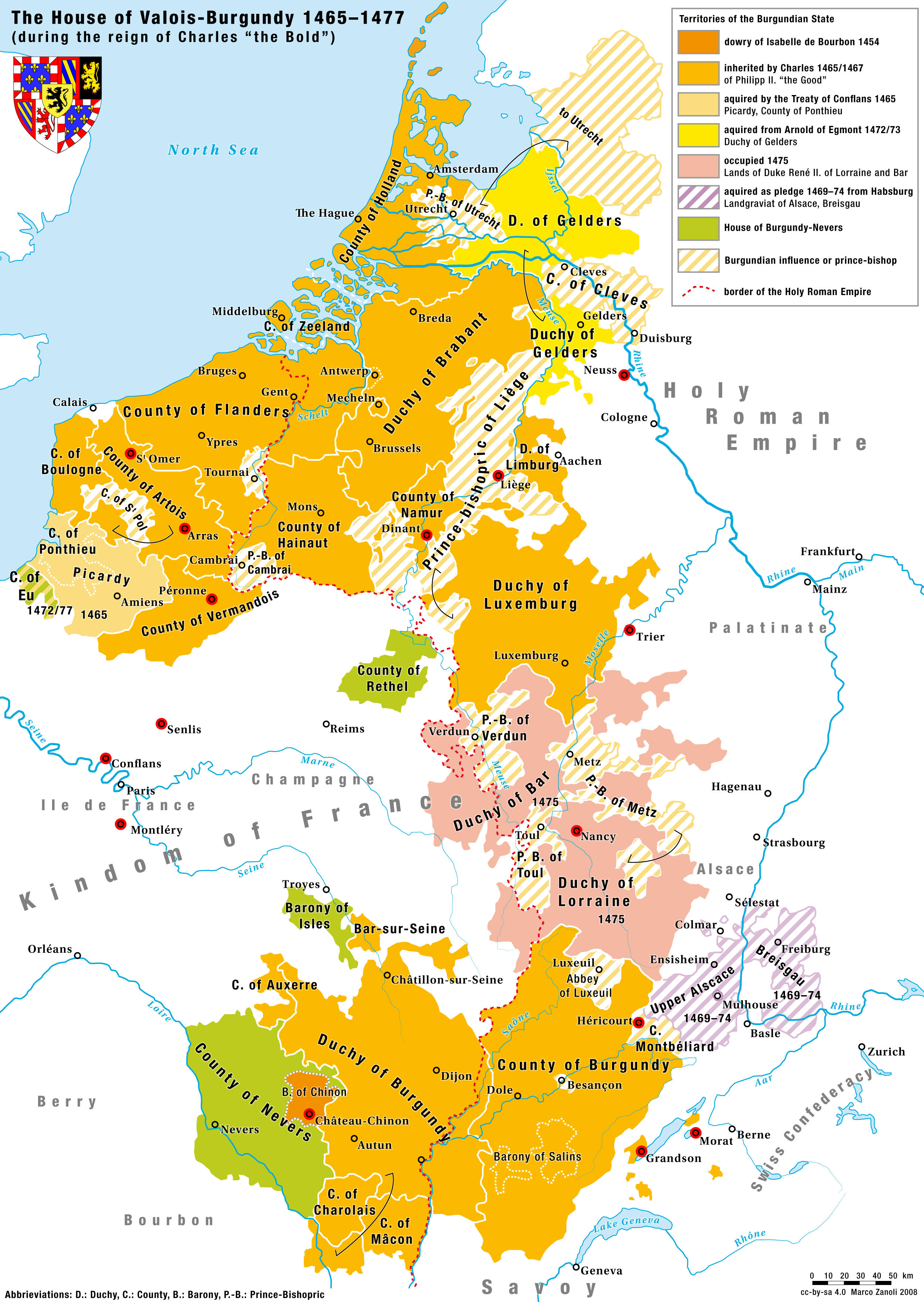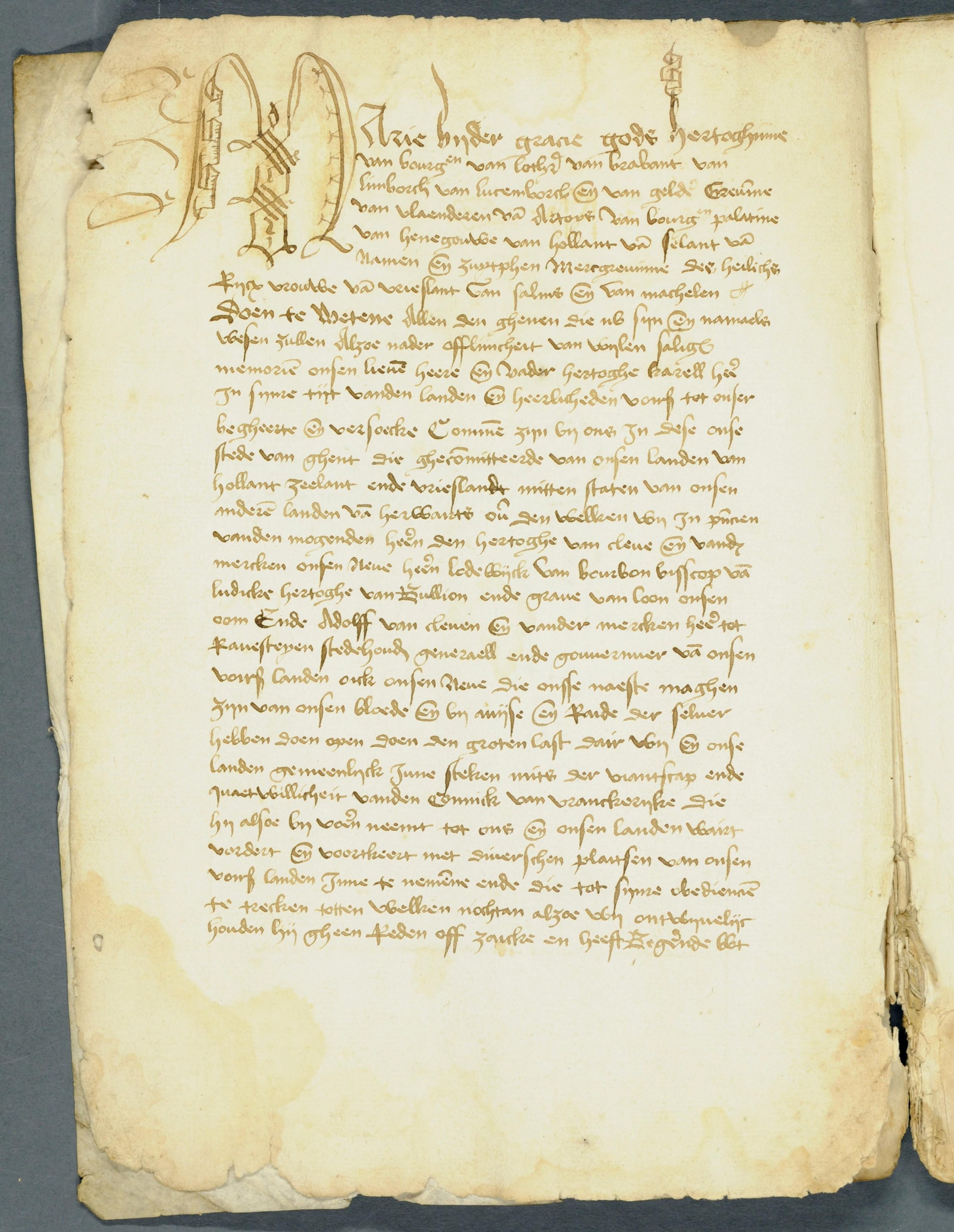|
1477
Year 1477 (Roman numerals, MCDLXXVII) was a common year starting on Wednesday (link will display the full calendar) of the Julian calendar. Events January–December * January 5 – Battle of Nancy: Charles the Bold of Duchy of Burgundy, Burgundy is again defeated, and this time is killed; this marks the end of the Burgundian Wars. * February? – Volcano Bardarbunga erupts, with a VEI of 6. * February 11 – Mary of Burgundy, the daughter of Charles of Burgundy, Charles the Bold, is forced by her disgruntled subjects to sign the ''Great Privilege'', by which the Flemish cities recover all the local and communal rights which have been abolished by the decrees of the dukes of Burgundy, in their efforts to create in the Low Countries a centralized state. * February 27 – Uppsala University is founded, becoming the first university in Sweden and all of Scandinavia. * August 19 – Mary of Burgundy marries Maximilian I, Holy Roman Emperor, in Ghent, bring ... [...More Info...] [...Related Items...] OR: [Wikipedia] [Google] [Baidu] |
Mary Of Burgundy
Mary (french: Marie; nl, Maria; 13 February 1457 – 27 March 1482), nicknamed the Rich, was a member of the House of Valois-Burgundy who ruled a collection of states that included the duchies of Limburg, Brabant, Luxembourg, the counties of Namur, Holland, Hainaut and other territories, from 1477 until her death in 1482. As the only child of Charles the Bold, Duke of Burgundy, and his wife Isabella of Bourbon, she inherited the Burgundian lands at the age of 19 upon the death of her father in the Battle of Nancy on 5 January 1477. In order to counter the appetite of the French king Louis XI for her lands, she married Maximilian of Austria. The marriage kept large parts of the Burgundian lands from disintegration, but also changed of the dynasty from the Valois to the Habsburg (the Duchy of Burgundy itself soon became a French possession). This was a turning point in European politics, leading to a French–Habsburg rivalry that would endure for centuries. Early years Mary ... [...More Info...] [...Related Items...] OR: [Wikipedia] [Google] [Baidu] |
Charles The Bold
Charles I (Charles Martin; german: Karl Martin; nl, Karel Maarten; 10 November 1433 – 5 January 1477), nicknamed the Bold (German: ''der Kühne''; Dutch: ''de Stoute''; french: le Téméraire), was Duke of Burgundy from 1467 to 1477. Charles's main objective was to be crowned king by turning the growing Burgundian State into a territorially continuous kingdom. He declared himself and his lands independent, bought Upper Alsace and conquered Zutphen, Guelders and Lorraine, uniting at last Burgundian northern and southern possessions. This caused the enmity of several European powers and triggered the Burgundian Wars. Charles's early death at the Battle of Nancy at the hands of Swiss mercenaries fighting for René II, Duke of Lorraine, was of great consequence in European history. The Burgundian domains, long wedged between the Kingdom of France and the Habsburg Empire, were divided, but the precise disposition of the vast and disparate territorial possessions involved ... [...More Info...] [...Related Items...] OR: [Wikipedia] [Google] [Baidu] |
Charles Of Burgundy
Charles I (Charles Martin; german: Karl Martin; nl, Karel Maarten; 10 November 1433 – 5 January 1477), nicknamed the Bold (German: ''der Kühne''; Dutch: ''de Stoute''; french: le Téméraire), was Duke of Burgundy from 1467 to 1477. Charles's main objective was to be crowned king by turning the growing Burgundian State into a territorially continuous kingdom. He declared himself and his lands independent, bought Upper Alsace and conquered Zutphen, Guelders and Lorraine, uniting at last Burgundian northern and southern possessions. This caused the enmity of several European powers and triggered the Burgundian Wars. Charles's early death at the Battle of Nancy at the hands of Swiss mercenaries fighting for René II, Duke of Lorraine, was of great consequence in European history. The Burgundian domains, long wedged between the Kingdom of France and the Habsburg Empire, were divided, but the precise disposition of the vast and disparate territorial possessions involved w ... [...More Info...] [...Related Items...] OR: [Wikipedia] [Google] [Baidu] |
Maximilian I, Holy Roman Emperor
Maximilian I (22 March 1459 – 12 January 1519) was King of the Romans from 1486 and Holy Roman Emperor from 1508 until his death. He was never crowned by the pope, as the journey to Rome was blocked by the Venetians. He proclaimed himself Elected Emperor in 1508 (Pope Julius II later recognized this) at Trent, thus breaking the long tradition of requiring a Papal coronation for the adoption of the Imperial title. Maximilian was the son of Frederick III, Holy Roman Emperor, and Eleanor of Portugal. Since his coronation as King of the Romans in 1486, he ran a double government, or ''Doppelregierung'' (with a separate court), with his father until Frederick's death in 1493. Maximilian expanded the influence of the House of Habsburg through war and his marriage in 1477 to Mary of Burgundy, the ruler of the Burgundian State, heir of Charles the Bold, though he also lost his family's original lands in today's Switzerland to the Swiss Confederacy. Through marriage of his son Phil ... [...More Info...] [...Related Items...] OR: [Wikipedia] [Google] [Baidu] |
Duchy Of Burgundy
The Duchy of Burgundy (; la, Ducatus Burgundiae; french: Duché de Bourgogne, ) emerged in the 9th century as one of the successors of the ancient Kingdom of the Burgundians, which after its conquest in 532 had formed a constituent part of the Frankish Empire. Upon the 9th-century partitions, the French remnants of the Burgundian kingdom were reduced to a ducal rank by King Robert II of France in 1004. Robert II's son and heir, King Henry I of France, inherited the duchy but ceded it to his younger brother Robert in 1032. Other portions had passed to the Imperial Kingdom of Burgundy-Arles, including the County of Burgundy (Franche-Comté). Robert became the ancestor of the ducal House of Burgundy, a cadet branch of the royal Capet dynasty, ruling over a territory that roughly conformed to the borders and territories of the modern region of Burgundy (Bourgogne). Upon the extinction of the Burgundian male line with the death of Duke Philip I in 1361, the duchy reverted to King ... [...More Info...] [...Related Items...] OR: [Wikipedia] [Google] [Baidu] |
Battle Of Nancy
The Battle of Nancy was the final and decisive battle of the Burgundian Wars, fought outside the walls of Nancy on 5 January 1477 by Charles the Bold, Duke of Burgundy, against René II, Duke of Lorraine, and the Swiss Confederacy. René's forces won the battle, and Charles' mutilated body was found three days later. Background Charles was besieging the city of Nancy, capital of Lorraine, since 22 October 1476 following its recapture by the forces of René II earlier in the year. Despite the harsh winter conditions, Charles was determined to bring the siege to an end at all costs as he was well aware that sooner or later René would arrive with a relieving army when the weather improved. By late December René had gathered some 10,000–12,000 men from Lorraine and the Lower Union (of the Rhine); a Swiss army of 8,000–10,000 men also arrived to help out. René began his advance on Nancy early in January 1477, moving cautiously through the snow-covered landscape until the ... [...More Info...] [...Related Items...] OR: [Wikipedia] [Google] [Baidu] |
Burgundian Wars
The Burgundian Wars (1474–1477) were a conflict between the Burgundian State and the Old Swiss Confederacy and its allies. Open war broke out in 1474, and the Duke of Burgundy, Charles the Bold, was defeated three times on the battlefield in the following years and was killed at the Battle of Nancy in 1477. The Duchy of Burgundy and several other Burgundian lands then became part of France, and the Burgundian Netherlands and Franche-Comté were inherited by Charles's daughter, Mary of Burgundy, and eventually passed to the House of Habsburg upon her death because of her marriage to Maximilian I, Holy Roman Emperor. Background The dukes of Burgundy had succeeded, over a period of about 100 years, in establishing their rule as a strong force between the Holy Roman Empire and France. The consolidation of regional principalities with varying wealth into the Burgundian State brought great economic opportunity and wealth to the new power. In fact, a deciding factor for many elites in ... [...More Info...] [...Related Items...] OR: [Wikipedia] [Google] [Baidu] |
Uppsala University
Uppsala University ( sv, Uppsala universitet) is a public university, public research university in Uppsala, Sweden. Founded in 1477, it is the List of universities in Sweden, oldest university in Sweden and the Nordic countries still in operation. The university rose to significance during the rise of Swedish Empire, Sweden as a great power at the end of the 16th century and was then given a relative financial stability with a large donation from King Gustavus Adolphus of Sweden, Gustavus Adolphus in the early 17th century. Uppsala also has an important historical place in Swedish national culture, identity and for the Swedish establishment: in historiography, literature, politics, and music. Many aspects of Swedish academic culture in general, such as the white student cap, originated in Uppsala. It shares some peculiarities, such as the student nation system, with Lund University and the University of Helsinki. Uppsala belongs to the Coimbra Group of European universities a ... [...More Info...] [...Related Items...] OR: [Wikipedia] [Google] [Baidu] |
Great Privilege
The Great Privilege was an instrument signed by Mary of Burgundy on 11 February 1477, which reconfirmed a number of privileges to the States General of the Netherlands. Under this agreement, the provinces and towns of Flanders, Brabant, Hainaut, and Holland recovered all the local and communal rights which had been abolished by the decrees of the preceding dukes of Burgundy Charles the Bold and Philip the Good in their efforts to create a centralised state on the French model out of their separate holdings in the Low Countries. Background As Charles the Bold died unexpectedly on 5 January 1477, during the battle of Nancy, his daughter Mary of Burgundy became Duchess of Burgundy at the age of nineteen. At the time, her marriage to Maximilian I had not yet been solemnized, so she stood alone for the heavy task of defending the succession states against the various rulers of neighbouring countries. Mary's position was weak. Louis XI of France had taken Burgundy and Franche Comté a ... [...More Info...] [...Related Items...] OR: [Wikipedia] [Google] [Baidu] |
Dictes And Sayings Of The Philosophers
''Dicts and Sayings of the Philosophers'' ("The Sayings of the Philosophers") is an incunabulum, or early printed book. The Middle English work is a translation, by Anthony Woodville, of an original book written in Arabic by the medieval Arab scholar al-Mubashshir ibn Fatik', titled ''Mukhtār al-ḥikam wa-maḥāsin al-kalim'' (مختار الحكم ومحاسن الكلم) which had been translated into several languages. Woodville based his version on an earlier French translation. His translation would come to be printed by William Caxton in 1477 as either the first, or one of the earliest, books printed in the English language.''DNB'', p. 383 Description The manuscript of the French translation ''Dits Moraulx des Philosophes'' describes itself as a compendium of the words of wisdom, or collected quotations, from biblical, classical, and legendary philosophers, written in prose form. Generally the chapters are introduced by some biographical notes on the philosopher, fol ... [...More Info...] [...Related Items...] OR: [Wikipedia] [Google] [Baidu] |
Low Countries
The term Low Countries, also known as the Low Lands ( nl, de Lage Landen, french: les Pays-Bas, lb, déi Niddereg Lännereien) and historically called the Netherlands ( nl, de Nederlanden), Flanders, or Belgica, is a coastal lowland region in Northwestern Europe forming the lower basin of the Rhine–Meuse–Scheldt delta and consisting of three countries: Belgium, the Netherlands and Luxembourg. Geographically and historically, the area also includes parts of France and Germany such as the French Flanders and the German regions of East Frisia and Cleves. During the Middle Ages, the Low Countries were divided into numerous semi-independent principalities. Historically, the regions without access to the sea linked themselves politically and economically to those with access to form various unions of ports and hinterland, stretching inland as far as parts of the German Rhineland. Because of this, nowadays not only physically low-altitude areas, but also some hilly or elevated regi ... [...More Info...] [...Related Items...] OR: [Wikipedia] [Google] [Baidu] |
February 27
Events Pre-1600 * 380 – Edict of Thessalonica: Emperor Theodosius I and his co-emperors Gratian and Valentinian II declare their wish that all Roman citizens convert to Nicene Christianity. * 425 – The University of Constantinople is founded by Emperor Theodosius II at the urging of his wife Aelia Eudocia. * 907 – Abaoji, chieftain of the Yila tribe, is named khagan of the Khitans. *1560 – The Treaty of Berwick is signed by England and the Lords of the Congregation of Scotland, establishing the terms under which English armed forces were to be permitted in Scotland in order to expel occupying French troops. * 1594 – Henry IV is crowned King of France. 1601–1900 *1617 – Sweden and the Tsardom of Russia sign the Treaty of Stolbovo, ending the Ingrian War and shutting Russia out of the Baltic Sea. *1626 – Yuan Chonghuan is appointed Governor of Liaodong, after leading the Chinese into a great victory against the Manchurians under N ... [...More Info...] [...Related Items...] OR: [Wikipedia] [Google] [Baidu] |










